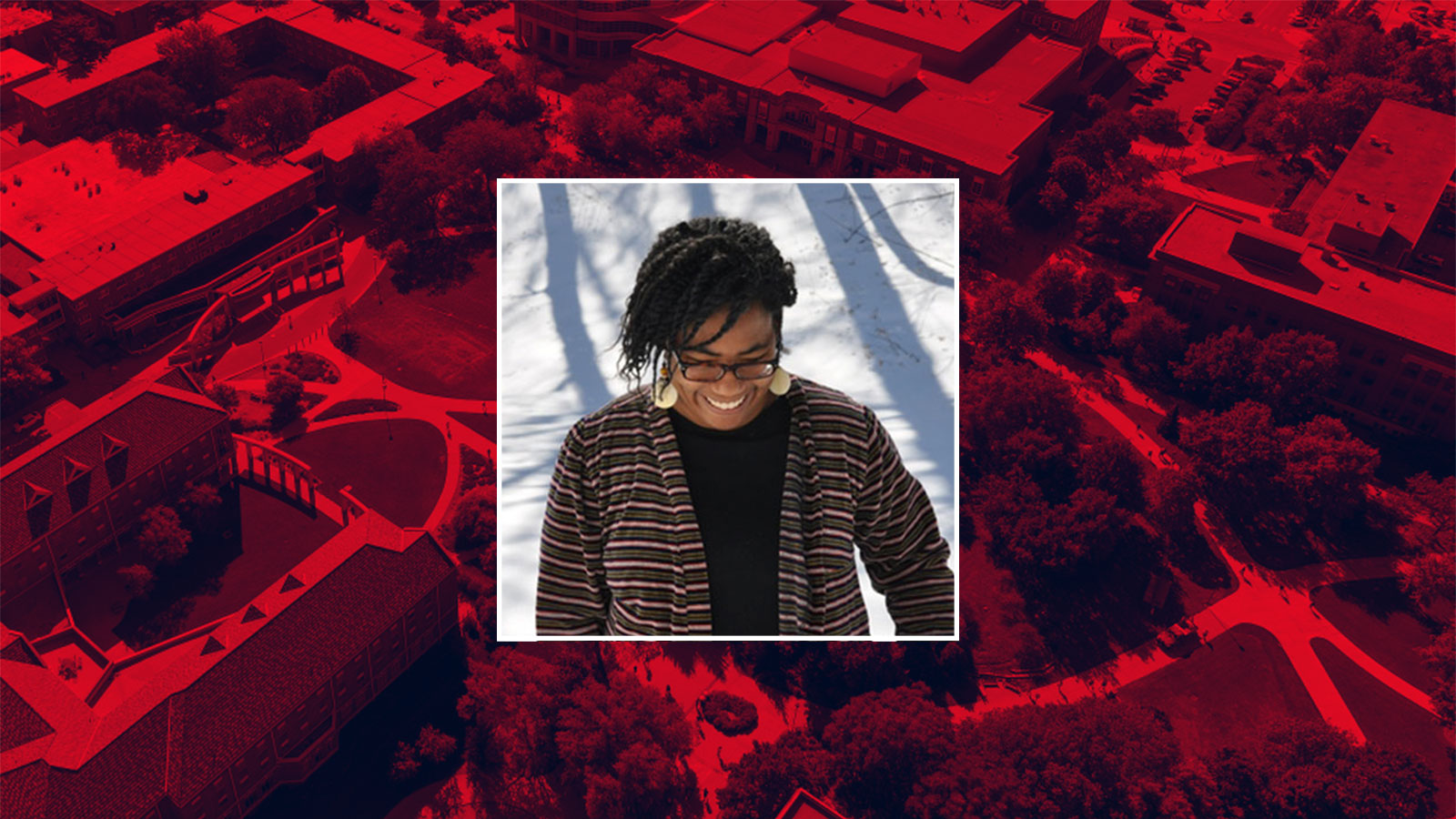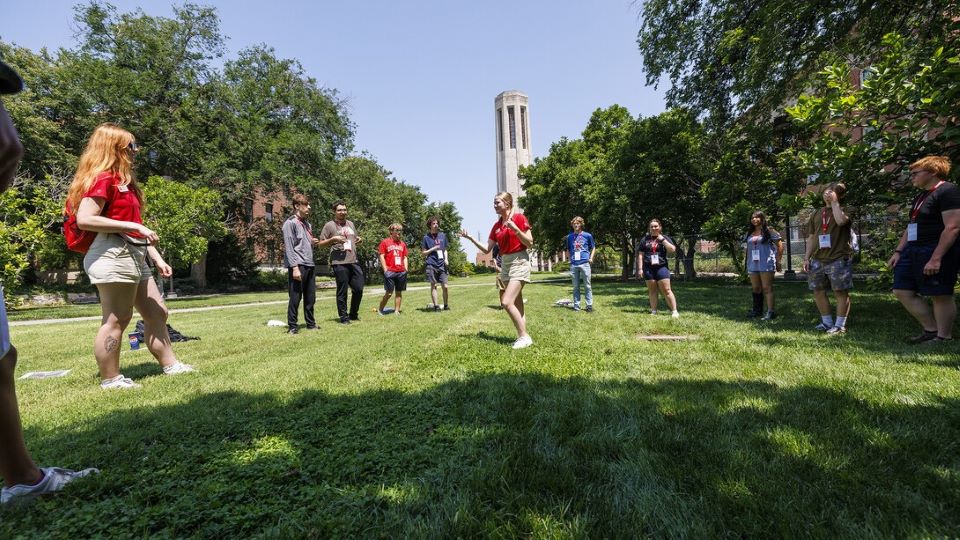
Dr. DeMisty D. Bellinger, who earned her Ph.D. in creative writing in 2012, is an associate professor at Fitchburg State University in Fitchburg, Massachusetts. Her debut novel New to Liberty, which originated in her creative dissertation, was published this year and was a “Book of the Day” recommendation from the New York Public Library. The novel, told in three parts, follows three women, living decades apart in the same area of rural Kansas, in their pursuits of agency, growth, and love.
In addition to her fiction, Dr. Bellinger has written two volumes of poetry, Rubbing Elbows and Peculiar Heritage, published in 2017 and 2021, respectively. She is also a poetry editor at Malarkey Books and an alumni reader for Prairie Schooner.
What are you currently most excited about in your professional life?
I’m excited about being in a position where I am able to offer influence to students and up-and-coming writers, both at AWP (Association of Writers & Writing Programs) and here at Fitchburg State University. That’s exciting to me.
But as far as writing goes, I haven’t been writing much lately, and it’s partly because I have a four-four teaching load. I started writing a story that’s swimming in voodoo and history, so that’s a lot of fun, when I get back to it.
And you write both prose and poetry?
I studied fiction at the University of Nebraska, and I came into poetry much later. I got this job, which was for a fiction writer who may be able to teach poetry, and then when I came, the poet left because of citizenship issues. He was invited back, but he decided to stay in Canada. So I felt obliged to write and publish poetry, and so I started with poetry really as I was teaching the poetry classes.
The way that I entered poetry is through persona and through storytelling, because that’s where I feel more comfortable—in fiction. I love reading poetry, and I love writing it. It’s fun to write. I love teaching it, especially to students who are very reluctant. Most of my students are undergraduate students—In fact, this is the first year I’m teaching graduate-level students!— and students find out that poetry is not what they assumed it to be. I don’t know what happens to them in K-12, because I think some of the first literature that we’re exposed to is poetry—through nursery rhymes and whatnot—and something happens where we’re forced to look at poetry in a particular way and aren’t able to deviate from that.
What was your favorite class or your favorite project at UNL?
I first took a fiction workshop with Judy Slater, and I fell in love with her immediately, her very quiet way of guiding a workshop. She was not controlling at all, she was never insulting, so I enjoyed that class and writing with her, and she eventually became my adviser.
Because I did not come in with funding, and I did not have a teaching assistantship, for those first two years, I asked to intern in one of her (Slater’s) classes. It was twentieth century lit, and she taught it through the lens of the American dream, which I loved because I’m really into working class fiction. And just being in that classroom and learning how to teach by watching as an observer, and sometimes I led class discussion. I developed my comprehensive exam reading list, my focus, in that class, which was working class fiction. So I think that was my favorite long-term project, which is not creative writing, but it speaks to my writing in many ways. A couple of the books that I read from that project inspired the novel that I eventually would write in Timothy Schaffert’s class.
Which UNL professors had an especially positive influence on you?
I would say both Judy Slater and Timothy Schaffert. They both believed in my writing immediately. Judy told me that I had a very distinctive style, and no one has ever said anything remotely similar. People have said they liked my writing in the past, of course; otherwise, I wouldn’t have gone to grad school for it. But that was something specific that I could hang onto and lean into.
And I think the same with Professor Schaffert. He is one of the people who got me to this place in life. He really encouraged me to finish writing. I started the novel in his novel-writing class. He enjoyed the story so much, he encouraged me to finish, and it was because of him that I have a novel published at all.
That’s my dissertation, and it’s eight years later. (The novel was published in April 2022.) When I worked at the University of Nebraska Press, one of the things that they used to talk about was: “Don’t publish your dissertation as is.” They were talking about academic monographs, but I would say the same for any MFA thesis or creative dissertation too. It’s going to take work before you get it (to that point) for most of us. Some of us are great, like emily danforth; she's awesome. She got it out. And Steve Edwards, who is right down the hall from my office; he published his book before he graduated, I believe, with University of Nebraska Press.
It’s interesting that there are two UNL grads who work at Fitchburg State University.
Steve really inspired me to apply. He told me about the job, and I applied.
I really resonated with the students. This is a working-class campus—this is a school of social mobility—so a lot of the students who go here resonate with me because I came from that background too. And there are a lot of students of color here, which surprised me. A lot of first-gen students and a lot of vets. I am not a vet—I am a pacifist, I’m a hippie probably—but I have a lot of veterans, and one of the things I’m going to try to start, that I've talked to some of my students about, is a writing club for vets. Because I’ve noticed that in their work, they’re writing about certain things, and other things are more important to them, so it would be great to get them together. I wouldn’t be their adviser, but it would be great for them, and so far, they seem really excited about that prospect.
What was a favorite extracurricular activity or a favorite place in Lincoln?
Do you guys still have the No Name Readings? I really enjoyed those. Just going to hear my fellow students, especially students—You know, I didn’t take any poetry classes when I was there, and so it was fun to go hear students in other genres and hang out with people in a location where we could all just celebrate literature that we’d written, together. I think that was probably one of my favorite memories.
Another one is The Ross (Mary Riepma Ross Media Arts Center). I miss The Ross. They used to show a lot of Indie movies I liked, but also, they used to have this cartoon festival every year that was a lot of fun.
I also miss the popcorn! You guys have the popcorn shops, and there are no popcorn shops here. Every once in a while, I think about opening a popcorn shop... (laughing) There was this one popcorn shop we used to go to, and around Halloween, they’d have these rubber gloves, the clear ones. They put popcorn in them, and they put candy corn at the ends for fingernails.
Is there anything else you’d like to add?
When I applied to grad school, I didn’t have any publications. And then, when I was on the grad committee and looking at people’s apps to get into grad school at Nebraska, I thought, there is no way I would’ve been able to compete with these students. Because they were coming in with books. And I was thinking, why are you getting a graduate degree? But this is all to say that things don’t necessarily happen right away. I think lately, in academia, across the board, we want to see a return on our education—I hate saying “return” or “investment” or to equate academia with money at all—but things just take time. And I think I know that more and more as I grow older.
I think there was a point—I guess I was like 30-35—when I was just so stressed out that I didn’t have a book yet, I didn’t have this yet, I didn't have that yet. But things take time. They don’t necessarily have to happen right away. I tell my students this too: You might not get that job when you graduate at 21 or 22, in the field that you thought you’d get that job, but you might get it 10 years from now. Julie Iromuanya, another alum there—I consider her one of my best friends—used to always tell me that Toni Morrison wrote her first book when she was forty. And then when I saw 40, I was just like, “Aaaahhh...” (laughing) But some people start much later than that.


